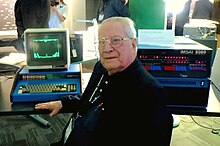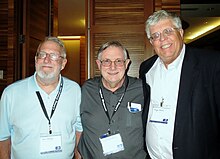Homebrew Computer Club


The Homebrew Computer Club played a major role in the development of the personal computer in the mid-1970s. It was an association of hobbyists , electronics enthusiasts who gathered to exchange information about parts, circuits and information on building computer equipment. It was founded on March 5, 1975 by Fred Moore and Gordon French and was the first club of its kind in the USA , more precisely in Menlo Park in San Mateo County . That was at a time when a personal computer was just a visionary idea; an idea that was dismissed as absurd by the then prevailing industry until the late 1970s. The founders were interested in finding a regular, open forum to work together on making computers more accessible for everyone, based on an idea to which Ted Nelson dedicated a book in 1974 called Computer Lib .
Its members met every two weeks and were significantly involved in the implementation of their ideas and thus in the development of the personal computer and the resulting industry in Silicon Valley . The Homebrew Computer Club is therefore referred to as the “melting pot for an entire industry”. Many computer pioneers and entrepreneurs emerged from their ranks; in 1976 they created the first mass-produced personal computers affordable for private households. In December 1986 the club was closed.
The journalist Steven Levy writes about the club in his book Hackers - Heroes of the Computer Revolution about an open exchange of ideas among hackers , which enabled the development of inexpensive computers in a handy design and thus triggered the PC revolution. Its members included a large number of important personalities, such as Steve Wozniak ("The Woz"; co-founder of Apple Computer ), Bob Marsh ( Processor Technology ), John T. Draper (hacking pioneer named Captain Crunch and software developer, including for Apple) , Thomas "Todd" Fischer ( IMSAI Division , Fischer-Freitas Company ), George Morrow ( Morrow Designs ), Paul Terrell ( Byte Shop ), Adam Osborne ( Osborne Computer ) and Jerry Lawson (developer of Fairchild Channel F ) and Harry Garland , Roger Melen ( Cromemco ), Li-Chen Wang (developer of the Palo Alto Tiny Basic and graphics software for the Cromemco Dazzler ) and Lee Felsenstein (developer of the first portable computer, called Osborne 1 , a forerunner of the later laptops; moderator of the club To meet).
At their meetings, they talked about the Altair 8800 or other technical topics and exchanged programming tricks in addition to circuit diagrams. Soon after the first meetings, hobby computer clubs appeared all over the world, such as the Dutch Homebrew Computer Club , whose members met near the city of Utrecht .
The term homebrew ( English for self-brewed beer ) has acquired a different meaning over time and today mostly refers to unauthorized or self-created programs for game consoles and handheld consoles .
- See also: hardware hackers
Web links
Individual evidence
- ^ A b c Steven Levy: Hackers: Heroes of the Computer Revolution . Doubleday 1984, ISBN 0-385-19195-2
- ↑ Homebrew And How The Apple Came To Be , atariarchives.org, accessed March 14, 2017.
- ↑ a b c see Hacker by Boris Grondahl from the Rotbuch 3000 series ( ISBN 3434535063 )
- ^ Harry McCracken: For One Night Only, Silicon Valley's Homebrew Computer Club Reconvenes . TIME Magazine. November 12, 2013. Retrieved on November 12, 2013: “… the open exchange of ideas that went on at its biweekly meetings did as much as anything to jumpstart the entire personal computing revolution. It was the crucible for an entire industry. "
- ↑ Steve Wozniak : " iWoz: How I invented the personal computer and co-founded Apple. ", Deutscher Taschenbuchverlag, October 2008, ISBN 978-3-423-34507-1
- ↑ Interview: Jerry Lawson, Black Video Game Pioneer. Vintage Computing and Gaming, February 24, 2009.
- ^ Bob Lash: Memoir of a Homebrew Computer Club Member . Retrieved May 6, 2013.
- ^ Oxford English-Deutsch, Dudenverlag

